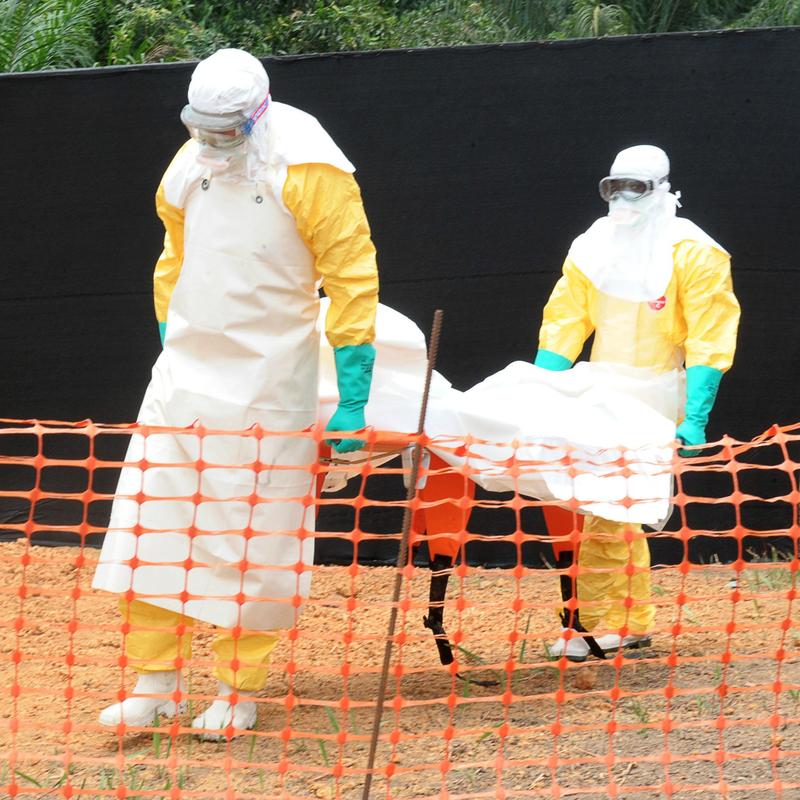BOB GARFIELD: On Monday, the World Health Organization announced that the death toll of the Ebola outbreak in West Africa topped 1,000, making it the deadliest Ebola epidemic on record. Since March, cases have also been documented in Guinea, Liberia, Sierra Leone and now Nigeria. This has led to breathless coverage of a terrifying Ebola march around the world, leaving grotesquely ravaged corpses along its path and - heading to our shores.
[CLIPS]:
GEORGE STEPHANOPOULOS/ABC NEWS: The CDC is raising its alert to the highest level, as it monitors the spreading virus, keeping a close watch for cases here in the US.
BRIAN WILLIAMS/NBC NEWS: And, of course, it can travel by air, right along with an infected passenger.
ERIC BOLLING/FOX NEWS: But I think it’s dangerous, dangerous to say things like, let’s not – let’s, let’s calm the rhetoric down, because we don’t know!
[END CLIPS]
BOB GARFIELD: Dr. Daniel Bausch is an associate professor at the Tulane School of Public Health and Tropical Medicine and has recently returned from Guinea, where he treated patients in association with the World Health Organization. Daniel, welcome to the show.
DR. DANIEL BAUSCH: Thank you.
BOB GARFIELD: The headlines are terrifying, a plane ride away and all that, but also gravely misleading. What is so difficult in distinguishing lethality from communicability?
DR. DANIEL BAUSCH: Well, that’s precisely the point that many people miss. Ebola, of course, is a very lethal virus, and so your chances of dying if you get it are terrifyingly high. But your chances of getting it are actually much lower than many other viruses that we’re much more familiar with. You have to have direct contact with the blood and bodily fluids, and it’s only during the period of illness, so it’s not when someone is incubating the virus. So if you, for example, traveled with someone and they were healthy right next to you in the plane and then three or four days later you learn that that person came down with Ebola virus, you would still have zero risk of contracting it.
BOB GARFIELD: One of your frustrations is that even in the face of extremely nuanced coverage by the journalists a single headline by a careless or cynical headline writer can undo all of the care that was put into the reporting itself.
DR. DANIEL BAUSCH: When I see headlines that say, Ebola Virus Likely to Go Global, even if in the, the text of the story that they really have it right, most people will think that that means that they somewhere in a small town in the United States or in Europe, they have the risk of getting Ebola. And the risks for those people are just infinitesimally small. So say that sometimes the scientific community has been a little bit mixed on this and, and how we portray it, but they need to keep the focus on the people who are really at risk, and those are people with direct contact with blood and bodily fluids, their healthcare workers, their family members taking care of the sick person; there are people attending the funeral and touching the corpse. If you don’t do any of those things, even if you live in Sierra Leone and Liberia, your risk of getting Ebola is extremely small.
BOB GARFIELD: There’s something so exotic about Ebola, and it has filled a place in the popular imagination now for some years, partly due to – well, to movies like “Outbreak” in 1995.
[CLIP]:
COL. SAM DANIELS (DUSTIN HOFFMAN): You got 19 dead, you got 100 more infected. It’s spreading like a brush fire.
MAN: What are you talking about?
COL. SAM DANIELS (DUSTIN HOFFMAN): If one of them has got it, then ten of them have got it now! And if one of them gets out of Cedar Creek, we have a very interesting problem.
GEN. DONALD MCCLINTOCK (DONALD SUTHERLAND): If that bug gets out of there, 260 million Americans will be dead or dy-ing.
[END CLIP]
BOB GARFIELD: It seems that the morbid fascination with it extends even to its treatment. When an experimental drug was employed, it had somehow become a miracle serum. Does anyone in the medical community call this cocktail of antibodies “a miracle serum”?
DR. DANIEL BAUSCH: No, no one would call it a miracle serum, and the other terms that I’ve seen, “secret serum” or “mystery serum.” This is an experimental drug. There’s published literature on this. It’s not something that was kept secret. And, and one has to remember that, and especially the media, the situation in West Africa is extremely tense, that has circulated amongst an already very suspicious population the idea that we have nefarious intentions, trying to manipulate populations, that we are harvesting people’s organs. So a headline that says that there’s a secret serum is certainly not helping and in the worst case it has the risk to lead to violence.
BOB GARFIELD: Is there a danger to the, the Western public to be exposed not to the Ebola virus but to the overblown coverage about it?
DR. DANIEL BAUSCH: For you to be concerned about it because you’re a concerned citizen and you need to react to a very significant problem in West Africa, I definitely encourage that. But for people losing sleep or having a fear for their own safety and their own health, that’s really misguided. And it also tends to take a lot of time and energy and potentially financial and human resources away from where they really need to be putting West Africa where we should be focusing.
BOB GARFIELD: Daniel, thank you very much.
DR. DANIEL BAUSCH: Thank you very much.
BOB GARFIELD: Dr. Daniel Bausch is an associate professor at the Tulane School of Public Health and Tropical Medicine and head of the Virology and Emerging Infections Department at the US Naval Medical Research Unit #6 in Lima, Peru. He spoke to us from there.

